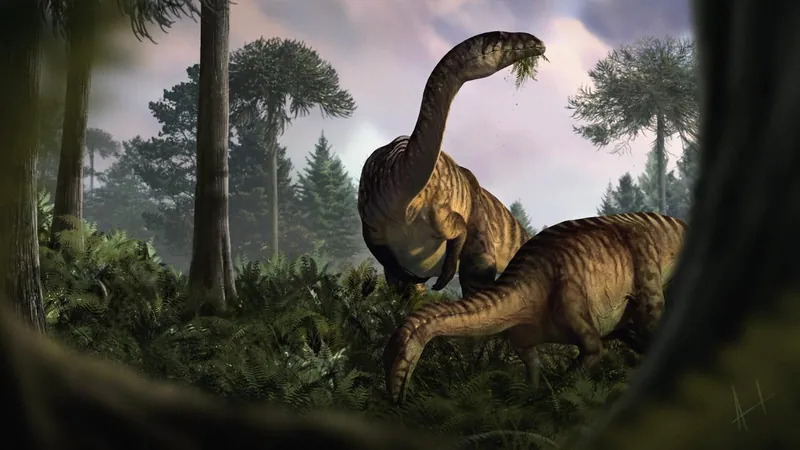
Ancient Poop Reveals Secrets of Dinosaur Dominance Over 200 Million Years Ago!
2024-11-29
Author: Jacques
Introduction
Dinosaurs ruled the Earth for tens of millions of years, but their success wasn't just due to their size or ferocity—it stemmed largely from their unexpected palate! Recent research published in the prestigious journal *Nature* shines new light on how these magnificent creatures managed to thrive during the Late Triassic and early Jurassic periods, thanks to an astonishing source: fossilized poop.
The Research
A team of paleontologists from the University of Uppsala in Sweden meticulously analyzed over 500 remnants of ancient digestive material known as bromalites. This fascinating dive into history included an examination of coprolites (fossilized droppings) and regurgitalites (fossilized vomit), which provided invaluable insight into the diets of some of the earliest dinosaurs, dating back more than 200 million years.
Dinosaur Diets
During an era known as the Late Triassic (roughly 230-200 million years ago), dinosaurs transitioned from lesser-known reptilian species to the ecological giants of their time. Thanks to their expansive diets, they were able to adapt and flourish amidst dramatic climatic shifts. Co-authors of the study, Martin Qvarnström and Grzegorz Niedźwiedzki, shared that their findings illustrate how seemingly ordinary fossils can unveil extraordinary insights into evolutionary history.
Methodology
The impressive trove of samples, gathered over 25 years from the Polish Basin, enabled researchers to employ modern techniques, including 3D imaging, to explore the internal structures of these ancient feces. The investigation revealed that the diets of these early dinosaurs included a diverse array of food, ranging from fish and insects to various plant materials. Some samples even contained well-preserved beetles and fragments of half-eaten fish, highlighting just how varied their diets really were.
Ecological Impact
This rich analysis of the ancient ecosystem allowed researchers to construct food webs, illustrating how these emerging dinosaur species adapted their eating habits in response to environmental changes. Crucially, it became evident that dinosaurs were far less finicky than many other species that co-existed with them, granting them a vital advantage in a world undergoing rapid climatic alterations.
Conclusion
Qvarnström emphasized the importance of studying ancient ecosystems, stating, "By examining the ecosystem responses of the past, we gain essential insights into how life adapts and thrives during shifting environmental conditions." This research unveils not only the dinosaurs' dietary flexibility but also serves as a reminder of how adaptability is crucial in the face of environmental upheaval.
In our ever-changing world, this ancient tale of survival may hold lessons for how current species—including humanity—can respond to their own environmental challenges. Who knew that the key to understanding dinosaur dominance lay buried all along in fossilized feces? The next time you think of dinosaurs, remember their successful adaptive strategies, driven by an omnivorous diet that set the stage for their reign over the Earth.









 Brasil (PT)
Brasil (PT)
 Canada (EN)
Canada (EN)
 Chile (ES)
Chile (ES)
 España (ES)
España (ES)
 France (FR)
France (FR)
 Hong Kong (EN)
Hong Kong (EN)
 Italia (IT)
Italia (IT)
 日本 (JA)
日本 (JA)
 Magyarország (HU)
Magyarország (HU)
 Norge (NO)
Norge (NO)
 Polska (PL)
Polska (PL)
 Schweiz (DE)
Schweiz (DE)
 Singapore (EN)
Singapore (EN)
 Sverige (SV)
Sverige (SV)
 Suomi (FI)
Suomi (FI)
 Türkiye (TR)
Türkiye (TR)